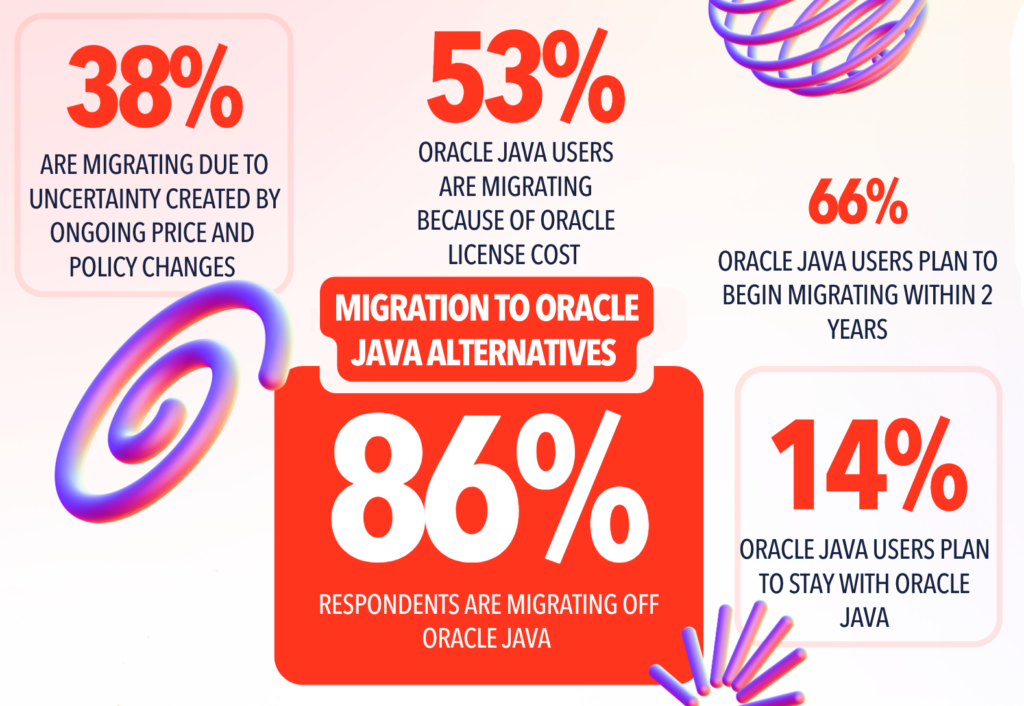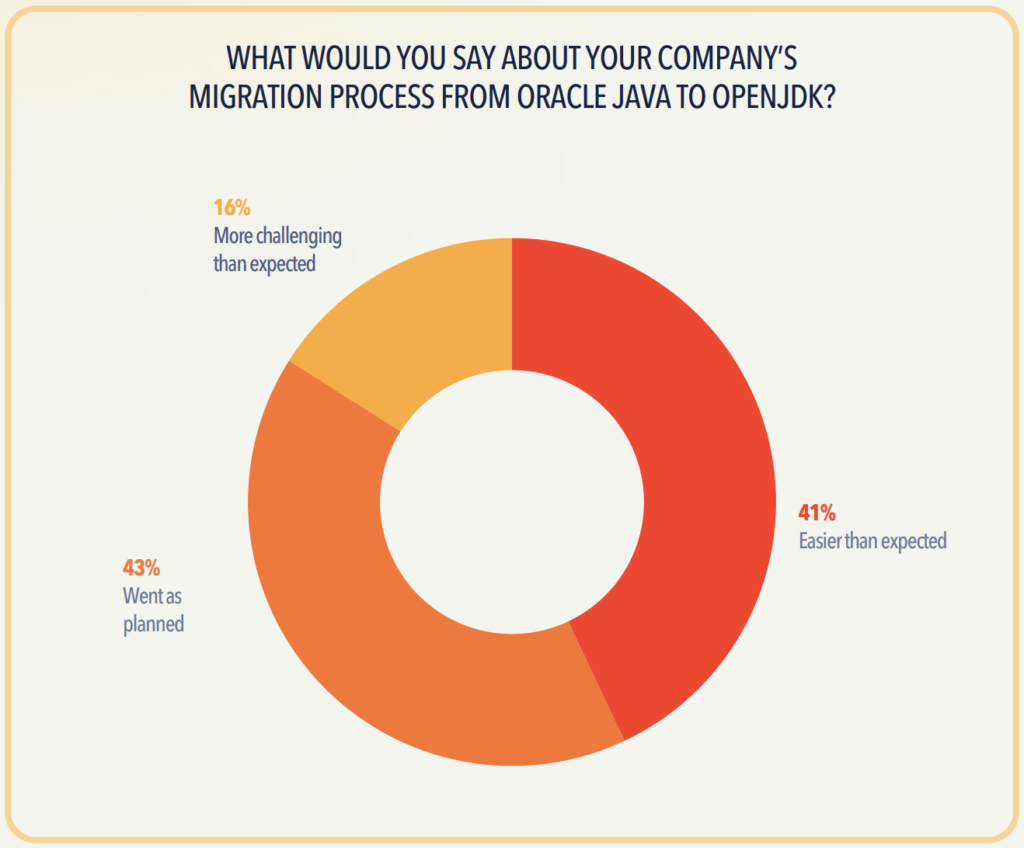
In July Azul released the Oracle Java Usage, Pricing & Migration Survey and Report. The global study of 663 professional Java users whose companies are current or former Oracle Java subscribers produced a result that surprised us, and we’re trying to solve the mystery.
This small minority of participants shares the following characteristics:
- They currently use Oracle Java
- They are on Oracle’s employee-based Java pricing model
- They are either currently migrating or planning to migrate some (but not all) of their Java from Oracle to another JDK provider
- They say price is a leading factor in migrating off Oracle Java
Of those survey participants:
- 35% are using JDK 17 but not JDK 21, so they will have to do something by September (when Oracle ends free updates for JDK 17)
- 40% are not using JDK 17 or JDK 21, so they are already paying for commercial support or using an unsupported Java version

What’s unusual about this group of Oracle Java users?
To see what’s odd about this selection of survey participants, let’s first review Oracle’s employee-based pricing model, introduced in January 2023.
Oracle Java’s new pricing model
Oracle’s per-employee Java pricing model charges based on the number of employees in a company, regardless of whether they use Java, including part-time employees, temporary employees, and contractors.
However, there are two caveats to Oracle Java’s pricing.
- Companies don’t have to pay per employee if:
- They are still on the previous pricing model, which is based on a processor-count metric for servers and a named-user-plus metric for desktops, as long as they don’t change their Java usage.
Companies don’t have to pay at all if:
- They are on a version that still has free Oracle JDK 17 updates through September 2024. After that, Oracle JDK reverts to the Java SE Oracle Technology Network License Agreement (OTNLA) and requires a Java SE Universal subscription to continue to receive updates. Oracle JDK 21 is free to use and receive updates for one year after the next LTS version release (Oracle JDK 25).
- They run their Java applications on Oracle Cloud Infrastructure (OCI) or use another Oracle product that bundles Java.
The fine line in Oracle Java
Still, survey participants said their greatest concern for staying with Oracle Java is cost. Even just one instance of Oracle Java makes a company subject to Oracle pricing regardless of the company’s current pricing model.
We don’t know if the 27% of survey respondents who are moving or planning to move some (but not all) of their Java off Oracle are using OCI to run Java; but if they’re not, they are almost certainly not saving money by migrating only a portion of their Java instances.
The most likely reason for the companies we identified earlier moving only some of their Java applications off Oracle is that they are:
- Unaware of the potential ramifications of leaving Java instances on Oracle – Experts say most per-employee subscription costs are 2-5x more expensive than the former model, and they say one in five users can expect an Oracle audit in the next three years.
- Unaware of what’s in their Java inventory – To create a complete JDK usage inventory, organizations must examine each machine in their estate that runs any Java Virtual Machine (JVM)–based applications to ensure they’re complying with licensing terms and conditions.
- Not confident in their ability to migrate off Oracle – In the report, 31% consider migrating to be too risky, 28% are afraid they won’t be able to migrate completely off Oracle and will still have to pay them, and 22% believe they lack the resources to migrate to an OpenJDK distribution. However, 84% of participants who have completed migrating off Oracle Java said their migration went as expected or was easier than they expected.

Tips for companies who are considering migrating
While companies are grappling with the risk of the high costs of Oracle Java, here are some tips for migration according to Azul’s OpenJDK Migration for Dummies:
- Identify your goals for migrating
- Make an inventory of which versions of Java are being used by which applications on which machines, including cloud instances, and create a migration plan.
- Choose only TCK-tested OpenJDK distributions
Why migrate to another Java distribution?
Half of the survey respondents reported that they prefer to use an open-source distribution, with increased interest in OpenJDK becoming more ideal in lieu of Oracle’s price increases.
Azul is typically 70% less expensive than Oracle and provides companies with many additional benefits:
- Security readiness: Curated builds with security-only fixes are delivered on a firm SLA.
- Support for older versions: Support matters as much for applications built on recently released versions like Java 21. Newly reported CVEs continue to affect both Java 6 and 7.
- Readily deployable security updates: OpenJDK full updates (Patch Set Updates or PSUs) typically contain several hundred changes, including bug fixes, enhancements, and around a dozen security patches. Of the last 22 OpenJDK full updates, six required ‘respins’ to fix issues with the release. Organizations that relied on Azul for commercial support and who updated using curated Critical Patch Updates (CPUs) with security-only fixes were not affected.
- 1-for-1 replacement for Oracle Java: Free distributions typically offer only around a dozen build configurations, but commercial support ensures you have the builds you need to update all your applications, regardless of version, platform, or architecture.
- Expert engineering support: Our globally distributed team provides support 24/7/365.
- Out-of-cycle releases: Our engineering team routinely comes through with bug fixes and production issue workarounds, including out-of-cycle patches to fix critical issues.
- IP Protection: Azul scans and works on every source file in every build to ensure customers are protected from contaminating code that would impose open-source license requirements on customer software.

Read more in Commercial Support for OpenJDK – The 5 Most Valuable Benefits of Premium Support from Azul
Companies say the qualities and features they value most in an OpenJDK distribution are:
- Technical expertise
- Timely releases and fixes
- Customer support
- Stabilized security-only updates
- Migration expertise
- Reduced licensing costs
Conclusion
Understanding what’s in your company’s Java estate is critical in migrating safely and effectively – while saving costs. To better understand how to perform a Java inventory, read OpenJDK for Dummies and visit the OpenJDK Migration Learning Hub.
Azul is here to help. Azul has the largest Java support team outside of Oracle with global support, providing 24×7 assistance at a 100% customer satisfaction rating. Azul Platform Core customers typically save 70%+ on costs versus Oracle Java SE.
Survey Report
More from the study of Oracle Java users.




